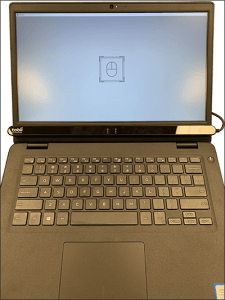Converus Releases First Automated Lie Detector Test for Those that Cannot Read
The new EyeDetect Audio MCT lets organizations conduct credibility assessment tests for those that cannot read. Governments can also use this new test on foreign nationals and immigrants.

The new EyeDetect Audio Multi-Issue Comparison Test allows governments and organizations worldwide to accurately verify the credibility of those with low to no reading skills.
LEHI, Utah – March 19, 2020 – Today Converus released a new version of its EyeDetect Multi-Issue Comparison Test (MCT) protocol that does not require examinees be able to read. The test is audio-based and is called the EyeDetect Audio Multi-Issue Comparison Test (AMCT). This new protocol allows governments and organizations worldwide to accurately verify the credibility of those with low to no reading skills.
EyeDetect is the first lie detector that detects deception by measuring involuntary eye behavior. Converus began testing an audio-only version of EyeDetect in Mexico in November 2015. The AMCT not only scores up to four relevant issues in a single test but also accurately identifies the target behavior or issue that caused the candidate to react and fail the test.
“We conducted a number of formal lab studies to develop and verify that the EyeDetect Audio MCT test works,” said Converus President and CEO Todd Mickelsen. “Our final lab study with 181 subjects showed its average accuracy was 81%. There are no questions or text presented on the screen, just objects to keep the examinee engaged with the screen while the eye tracker measures changes in eye behavior.”
Over the years, many companies have asked Converus for a version of EyeDetect for those that cannot read, including mining companies — where 10-20% of the employees can’t read — and companies in countries where foreign or immigrant laborers with low education levels are utilized. Governments worldwide can also use it without a translator or skilled examiner for testing immigrants and foreign nationals where security threats exist, but the person can’t read, Mickelsen added.
Since EyeDetect’s 2014 release, examinees have been required to read and answer a series of true/false questions during a 15- to 30-minute automated exam. With the AMCT, being able to read is no longer a requirement. Now the entire test is read to the examinee. During a test, EyeDetect’s eye-tracking camera measures involuntary eye behavior — including pupil dilation, blink rate and other eye movements. Computer algorithms then determine whether the examinee is credible or deceptive.
“The fact that we’re able to provide an accurate, fully automated test that doesn’t require the examinee to be able to read is revolutionary,” said Mickelsen. “And by automating the testing with a computer and an algorithm, we eliminate the situations where a human examiner may be fatigued, bribed or biased — EyeDetect consistently treats every examinee the same.”
The new AMCT requires a text-to-speech (TTS) voice, which is available for the most common languages. EyeDetect currently supports 34 languages.
For more information about EyeDetect and Converus, visit: converus.com
# # #
About Converus®
Converus provides scientifically validated credibility assessment technologies. EyeDetect® detects deception at 86-90% accuracy in 15-30 minutes by analyzing eye and other behaviors. IdentityDetect® detects falsified identities at 91% accuracy in about 1-3 minutes by analyzing subtle variations in the motor nervous system responses. These technologies help protect countries, corporations and communities from corruption, crime and threats. Converus is headquartered in Lehi, Utah, USA. Visit: www.converus.com
_____________________________________________
Converus Press Contact: Jeff Pizzino, APR /+1 480-606-8292

